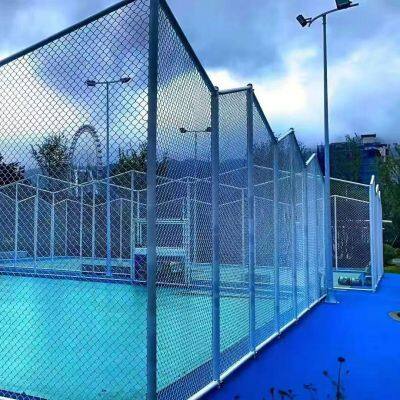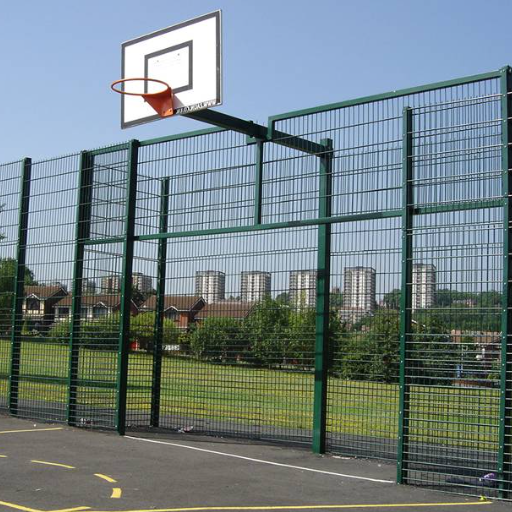-
 Liu
Hi there! Welcome to my shop. Let me know if you have any questions.
Liu
Hi there! Welcome to my shop. Let me know if you have any questions.
Your message has exceeded the limit.

Sport Court Fencing: The Ultimate Guide to Quality Sports Court Barriers
2025-10-04 21:09:22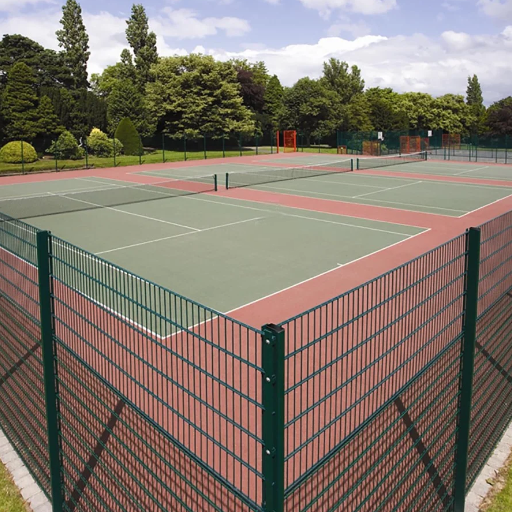
Installing the ideal sports court will always have its importance placed heavily upon quality fencing. Sport court fencing is, in fact, about safety, durability, and the overall playing experience. Selecting the right fencing for a basketball court, tennis court, or multi-use facility is very critical, as these fence systems protect players, spectators, and the immediate environment. This guide will take you through everything you do need to know in sports court barriers-from choosing between materials, considerations in design, maintenance, and installation. By the time you finish reading, you will be armed with knowledge sufficient to make an educated choice and with equipment that is practical yet professional. Find more info now
Sport Court Fencing Explained
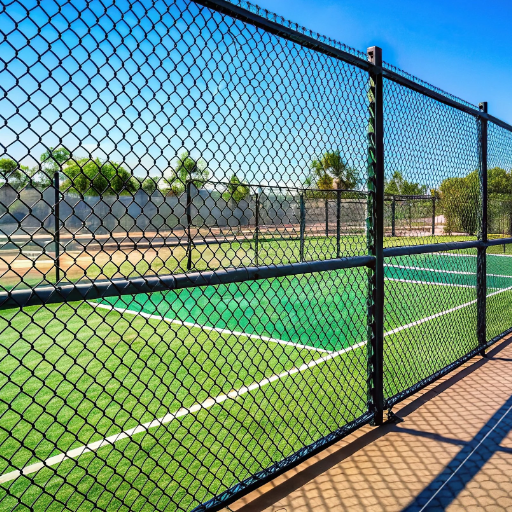
Sport court fencing is a protective barrier enclosing a sports court to ensure safety, security, and functionality. This is to prevent the ball from straying into the outside play area, protect spectators and property from wayward play, and offer a clear definition of the boundary line for the court. They commonly include chain-link, mesh, and netting, depending on their durability, cost, and the particular demands of the sport. Installation and maintenance ensure long-term performance as well as dependable protection of the users.
What is a Sports Court?
Any area designated for a particular sport or recreation is considered a sports court. Such courts are usually built using tough materials like asphalt, cement, or synthetic materials so that they provide safety or perform well. Such courts are marked with lines and boundaries unique from various sports such as basketball, tennis, or volleyball. Sports courts are seen in schools, community centers, parks, and private places, allowing a structured and safe place for athletes and enthusiasts to participate in sports.
Types of Sports Courts
The kinds of sports courts are built to cater to the activities and needs in question. Basketball courts are usually of hardwood, asphalt, or concrete: having standardized markings used during gameplay. Tennis courts can have any surface type: grass, clay, or hard courts-all heights are used to give speed variations and some variations in the dynamics of the game. Volleyball courts may either have a hard floor or be sandy for beach volleyball. Multipurpose courts are marked for a large number of sports and thus are perfect for schools and community centers. Each type of court is prepared with specific materials and dimensions suited to the respective sports, thereby offering maximum performance and safety to the players.
Importance of Fencing in Sports Courts
Fencing is an important component of sports courts since it serves to provide safety, security, and game management. The creation of the fence serves in preventing balls from going astray beyond the playing courts, diminishing interruptions, and maintaining the continuity of the game. Moreover, fencing helps keep spectators and bystanders at a sufficient distance, preventing the risk of injuries. For security purposes, it also sometimes prevents any unauthorized access into the facility or those set on vandalism. Also, proper fencing affords privacy for the players, mainly on private or commercial grounds, where having a separate environment for games and practice sessions matters.
Types of Fences for Sports Courts
Chain Link Fencing
It is a preferred fencing for sports courts owing to its durability, cost-effective nature, and ease of installation. The fence serves as a strong barrier while still allowing visibility and airflow.
Mesh Fence
Mesh fencing is light and is usually erected around tennis courts or similar establishments. It offers a smooth, uniform surface that works toward minimizing the chance of injury while allowing visibility.
Steel Fencing
Steel fencing is known for its strength and durability. It is appropriate for sports facilities where top security needs durability against usage.
Wooden Fencing
The wooden fence gives you a decent amount of privacy and a little acoustic barrier; hence, it fits for private or neighborhood sports courts. Maintenance is required to keep it in good condition.
PVC Fencing
PVC fencing is considered quite low-maintenance because it hardly ever looks untidy. Lazily considered weightless and highly weather-resistant, any sports facility would surely consider it an option.
Chain Link Fences
These versatile, cheap fencing options are mostly used in all kinds of sports complexes. Chain link fences are known for their durability and resistance to the weather with minimum maintenance, which makes them suitable for outdoor areas. Visibility is offered by the open design yet a gather boundary needs to be secure for the safety of the sportspersons. Later, chain link fences can become even more functional by coating them with special compounds or equipping them with privacy slats according to need.
Mesh Fences
Criando malhas de barreira altamente praticadas, por diversas aplicações, por sua flexibilidade e robustez. Fences can be manufactured in various sizes and widths of clothes so that it can be accommodated along specific needs. Fluorescent mesh has been designed to charge for very high visibility and landscape, so it is used in places where they need transparency coupled with security. While fitting into various starts with a galvanization or plastocoating to resist weather and corrosion and last long into customer age. They are placed to suit various needs from sports grounds and construction sites to residential buildings.
Privacy Fences
Privacy fences work best when creating areas that need seclusion or security with a solid barrier blocking visibility as well as noise. These are generally made of wood, vinyl, or composite panels, which are all considered durable and very successful in securing one's privacy. They are mainly used for residential backyards, pool areas, or commercial properties where parties value discretion. Privacy fences additionally allow for a height, design, or color selection fitting an aesthetic choice and fulfilling a functional need. These factors-their functioning capability and appearance-have been key reasons they are constantly chosen for private areas.
Installation of Sports Court Fencing
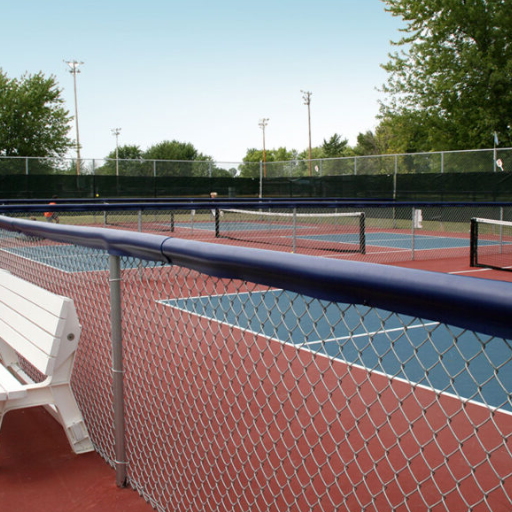
Inter alia, sports court fencing installation necessitates precise planning, preparation, and execution to maximize durability and safety. Measuring the court area is the initial step to ascertain the dimensions required for the installation of the fence. Install a durable post every given distance around the perimeter, making sure that it has been cemented well into the ground. Attach the fencing material, to wit, about chain-link or mesh to the posts, placing for the same, tensioning it correctly to prevent sagging. An inspection must then be conducted for any safety adjustments that might be required. This will, in turn, provide for a secure and well-professional enclosure for sports activities.
Choosing the Right Fencing Services
Factors affecting the selection of the right fencing services would include a company's reputation, the services they offer, and the experience they have. Check for reviews of the company and testimonials of former clients to establish if they truly portrayed reliability and quality workmanship. At the same time, make sure they provide the kind of fences you require so that your particular needs may be met in residential, commercial, or even sports applications. Find out whether they price their services transparently, supply you with detailed estimates, and have safety at the forefront. Lastly, the fencing company should also be able to offer you maintenance and repair works on your enclosure so that it could last in the long run.
Fencing installation process
The process for fence installation begins with that all-important consultation, discussing your requirements and preferences. A site inspection follows to run an assessment of the area and confirm the measurements. After the design and materials have been agreed upon, the company should provide a detailed estimate covering pricing and timelines. Installation includes preparing the site by clearing any obstructions and placing boundary marks, followed by the erection of posts and fixing up of the fencing panels or materials according to safety regulations. Afterward, the team may undertake a final inspection to ensure the fence meets quality standards and would provide maintenance and repair advice to ensure long-term durability.
The Maintenance for Sports Fencing
Once installed, sports fences should be regularly serviced and maintained so they stay safe and functional. If an inspection reveals a damaged section with areas showing signs of rust, loose connections, or exactly where a part has broken, such issues should be attended to immediately so that further deterioration is prevented. The correct cleaning procedures should also be used to cleanse; such dirt or debris would seem to weaken the materials if left there longer. Other activities include tightening the bolts, noticing wire tension, and reinforcing the post, which ensures the structure remains safe. Also, protective coatings may be applied to metal fences to protect them from weathering or corrosion. A well-maintained fence not only lasts long but also serves as a suitable platform that is safe for conducting sport activities.
Benefits of Sports Court Fencing
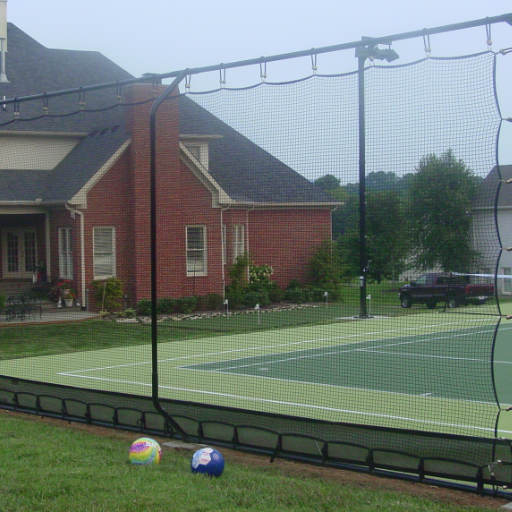
There are various benefits to fencing a sports court. With that, safety is provided for both players and spectators from stray balls; it erects walls that can demar something as a play area, hence exercising more organized gameplay. These fences also diminish external distractions and curtail any unauthorized access to the court. So, by ensuring safety and concentration, sports court fencing plays a direct role in giving way to an improved playing and safer working environment.
A Secure Place for the Athlete
One more benefit of sports court fencing is that it will assure privacy for the athlete. Fencing for the athlete is a place of seclusion where they can train or play without distractions. With this privacy, players can completely concentrate on their performance and not worry about anything distracting them or unwelcome spectators. Having a safe, secure, and private space for both amateur and professional athletes increases their confidence and reduces the stress associated with performing, hence supporting the athlete's experience in the best way possible.
Ball and Player Containment
Fences on sports courts prevent balls and players from escaping, therefore ensuring that the game goes smoothly without any interruptions. Thus fencing prevents balls from leaving the court to be retrieved, making it a time-saving way to keep the game flowing. Also, it confines and protects players within the play area, thus preventing their colliding with outside obstacles or spectators. Such containment is necessary both for their safety and for bringing an efficiency to the game; hence, the fencing is a must for any sports facility.
Safety in Sports Facility Improvement
In the realm of sports, fencing enhances overall safety by denoting boundaries and preventing unauthorized access and accidental intrusions. It ensures the segregation of spectators or bystanders from the areas where active playing occurs, thereby curbing the incidents of injury to players and bystanders alike. It further decreases the degree of hazards by containing sports equipment from escaping out of the area designated for games, thereby safeguarding against disruptions or accidents. Such an ordered environment permits a full concentration from the players on their performance, thus contributing to safety and a good time for all.
Residential Sports Court Fencing
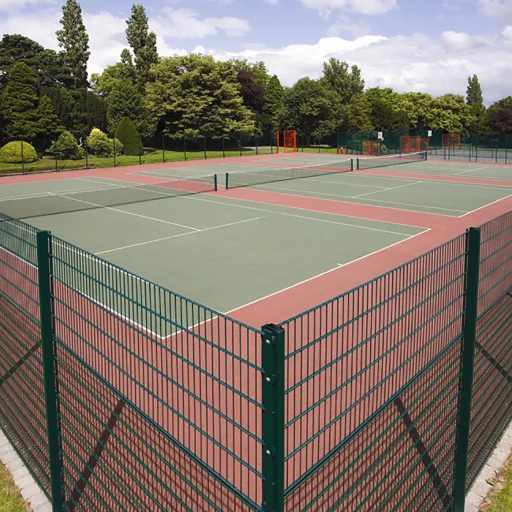
A fencing system for residential sports courts is essential to ensure a safe and utilitarian play environment in the house. It serves several purposes-from keeping the court secure against stray balls, to obtaining privacy, and confining the activity. It also terminates any possibilities of danger or disturbance to the players and spectators during the play. Chain-link, vinyl, and mesh are among the popular selections due to their durability, minimal maintenance, and endurance against weather conditions. Depending on the usage, choosing the correct material and height, we can assure the fence's long-term performance and ensure a good playing experience.
Backyard Sports Court Options
While making backyard sports court decisions, one will have to weigh the type of sport, space available, and the budget. Basketball players tend to prefer concrete or asphalt surfaces marked with painted court lines and a heavy-duty hoop. Tennis or pickleball courts are great on painted concrete with a cushioned coating for better performance and less stress on joints. Multi-sport courts can be an option with the aim of adaptability for volleyball, soccer, or badminton games. It is important to choose weather-resistant materials. Also to consider are drainage systems and proper lighting for optimum usability in all weather, so the area becomes one that can be reliably played on when casual or competitive is the setting.
Choosing High-Quality Residential Fencing
Choosing an excellent residential fence must factor in the material, durability, style, and maintenance needs. The choices abound, from wood to provide a natural look to vinyl for that maintenance-free, weather-resistant treatment or aluminum for a more contemporary approach to durability. First, determine if privacy, security, or merely decoration is the purpose of the fence, and then proceed to select a height and structure that will fulfill these ends. Ensure that the fencing material is compatible with climate conditions, as its lifespan will depend on it and hence will incur lesser future maintenance costs. Finally, find a reputable contractor or supplier who will ensure proper installation and of high-grade quality product.
Customizing Your Fence for Aesthetic Appeal
The style and design of a fence must be customized to complement and juxtapose an area. Solid wood or vinyl panels are great for privacy and giving an area a seamless ensemble. In contrast, wrought iron or steel perfectly fulfill the function of an ornamental grille since they keep people at bay with durability. For decoration, details such as lattice tops or ornamental post caps are nice accents. The color of the fence can either match the other colors of exterior paint on your house or stand out in contrast. Merge the fence into the landscaping design by adorning it with vessels like climbing plants or shrubs. Set according to your taste, these attributes will give you an operational and pleasing fence.
Frequently Asked Questions (FAQs)
What is a Sports Court Fencing System?
Sports court fencing is constructed to give security and structure to various culminations of sports. It is extremely essential for the maintenance of sport fields, whether it be tennis courts, baseball fields, or football fields. Sometimes, these fence systems may include cage netting or barrier screens to stop balls from leaving the country. They may also be made to exact fence specifications for either commercial or residential down the line. Beyond safety, a well-set-up fence exudes privacy to a recreational area.
How to Choose the Right Tennis Court Fence?
Some of the factors that one must take into consideration while selecting a tennis court fence are height, materials, and design. For a tennis court, the chain link fence is chosen mostly due to its sturdiness and ability to keep tennis balls safely within the court. You may also want some additional netting or windscreen for protection against the winds while enabling the players to concentrate. There could be some customized options to make sure that the fence fulfills your specifications. Proper installation will ensure that it stays firmly in place and performs well over the years.
What Are the Benefits of Barrier Netting in Sports Fencing?
Barrier netting serves an integral function in sports fencing, providing an additional layer of safety and containment. It holds the balls to their designated play areas, with games such as tennis, pickleball, and baseball relying heavily on this. It may also guard against injuries of particular types by deterring spectators who are not supposed to be close to active play. An excellent barrier netting system could complement the traditional fencing systems to give sports facilities enhanced functionality. Finally, it can be tailored to the dimensions and configurations of particular sports courts.
How Do Containment Fences Operate?
Court containment fencing encloses an area to keep players and spectators safe and to maintain the playing environment. This fencing becomes especially useful in athletic facilities where multiple sports are being conducted so that balls and equipment do not stray beyond the bounds of the playing area. The installation of containment fencing could be customized in its height, commonly about 10 ft high, depending on the specific sports' needs. Also, it may include features like fence screens and rebounder nets to augment the training and recreational experience.
What Are Custom Sports Products for Backyard Fencing?
The sports custom products for backyard fencing may entail a long list of solutions that are customized depending upon individual requirements. Homeowners can opt for fencing systems that can secure their properties while increasing the recreational usefulness of the backyard. Rebounder nets, cages, and barrier nets are all options that can transform just any backyard into a multi-purpose sports area. Such products can be customized for sports such as tennis, basketball, and soccer so that they fit and function according to precise requirements. Quality fencing can increase property value while it becomes a means of enjoyment for family and friends.
Tags: Sport Court Fencing, Basketball Court Fence
